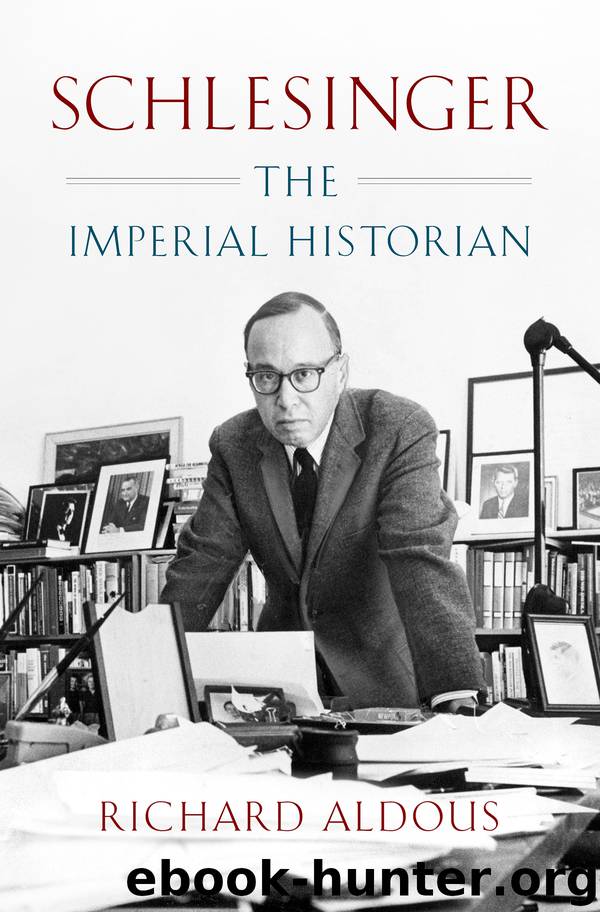Schlesinger by Richard Aldous

Author:Richard Aldous
Language: eng
Format: epub
Publisher: W. W. Norton & Company
CHAPTER FOURTEEN
LOOKING SO ARTHURISH
On the evening of Monday, September 11, 1961, Arthur Schlesinger Jr. set out to walk from his office in the East Wing of the White House to Georgetown. His doctor had constantly urged him to exercise more and lose weight (“You certainly have a problem with your weight, and I hope that you are successful in reducing it somewhat”), so Arthur tried to walk home as often as possible, particularly in the more temperate fall weather. On this occasion he was not heading for the crumbling old Federal Period house that the Schlesingers had rented on O Street (“People came to see us not for our interior decor, I can promise you,” Marian tartly observed). Instead he kept going past O Street to 29th and Q Streets to the home of former New Dealer Chester Bowles, now no. 2 at the State Department. There waiting for him was his old friend and Harvard colleague John Kenneth Galbraith, now US ambassador to India, and Adlai Stevenson, the man both had supported in 1952 and 1956 and current UN ambassador.1
These four downcast liberals, Galbraith recorded afterwards, “all talked mournfully about our foreign policy.” A few days earlier, Stevenson had endured a testy meeting with the president. After hearing Stevenson’s critique of his decision to resume nuclear testing and his argument that it gave away an advantage in the propaganda war, Kennedy dismissed the ambassador out of hand. “What does that mean?” Kennedy had asked about the propaganda war. “Anyway,” he added dismissively, “the decision has been made.” Later that evening Stevenson would be further outraged when Schlesinger began “toying provisionally” with an idea of John McCloy’s. “World opinion?” the president’s principal disarmament advisor had scoffed, “I don’t believe in world opinion. The only thing that matters is power.” For Stevenson, it was a phrase that would stick and to which he would return a year later in the most famous speech of his life. Chester Bowles shared Stevenson’s dismay. The last months, he had written in his diary, demonstrated “how far astray a man as brilliant and well-intentioned as Kennedy can go who lacks a basic moral reference point.” The disillusionment was mutual; Kennedy would sack him two months later in the so-called Thanksgiving Day Massacre.
“The President snuck up on him one day,” Robert Kennedy recalled, “and got him fired.” In fact the attorney general was no fan of Bowles either, both for his disloyalty in the aftermath of the Bay of Pigs and for his opposition to RFK’s plan for intervention in the Dominican Republic after the assassination of President Rafael Trujillo Molina earlier in 1961. The problem, Schlesinger would write later, was that the Kennedys “put a premium on quick, tough, laconic, dedicated people and [were] easily exasperated by more speculative types” like Bowles. It was a judgment Schlesinger feared might apply to the four who gathered around the dinner table that night.2
A month earlier, knowing his relationship to Stevenson was close, Kennedy had charged Schlesinger in advance of the upcoming UN General Assembly with managing the ambassador.
Download
This site does not store any files on its server. We only index and link to content provided by other sites. Please contact the content providers to delete copyright contents if any and email us, we'll remove relevant links or contents immediately.
Waking Up in Heaven: A True Story of Brokenness, Heaven, and Life Again by McVea Crystal & Tresniowski Alex(37768)
Empire of the Sikhs by Patwant Singh(23061)
We're Going to Need More Wine by Gabrielle Union(19020)
Hans Sturm: A Soldier's Odyssey on the Eastern Front by Gordon Williamson(18555)
Leonardo da Vinci by Walter Isaacson(13292)
The Radium Girls by Kate Moore(12003)
Tools of Titans by Timothy Ferriss(8347)
Educated by Tara Westover(8035)
How to Be a Bawse: A Guide to Conquering Life by Lilly Singh(7458)
Permanent Record by Edward Snowden(5812)
The Last Black Unicorn by Tiffany Haddish(5617)
The Rise and Fall of Senator Joe McCarthy by James Cross Giblin(5259)
Promise Me, Dad by Joe Biden(5130)
The Wind in My Hair by Masih Alinejad(5070)
A Higher Loyalty: Truth, Lies, and Leadership by James Comey(4937)
The Crown by Robert Lacey(4791)
The Iron Duke by The Iron Duke(4337)
Joan of Arc by Mary Gordon(4080)
Stalin by Stephen Kotkin(3940)
